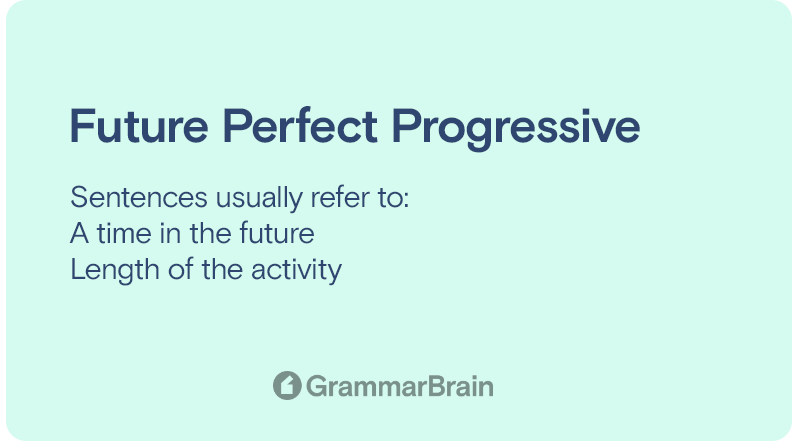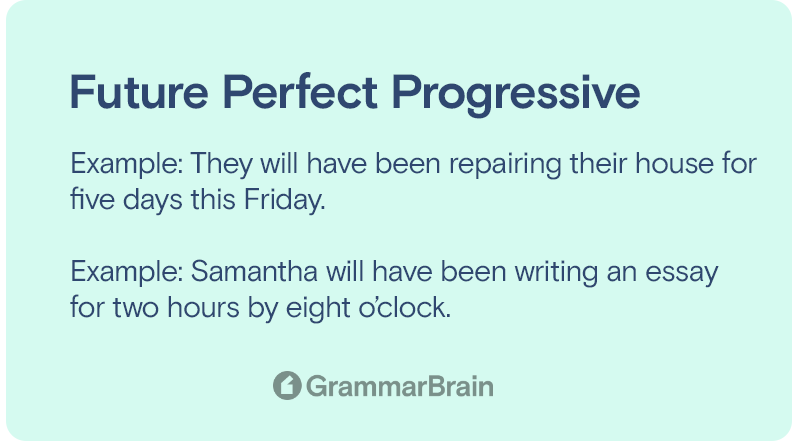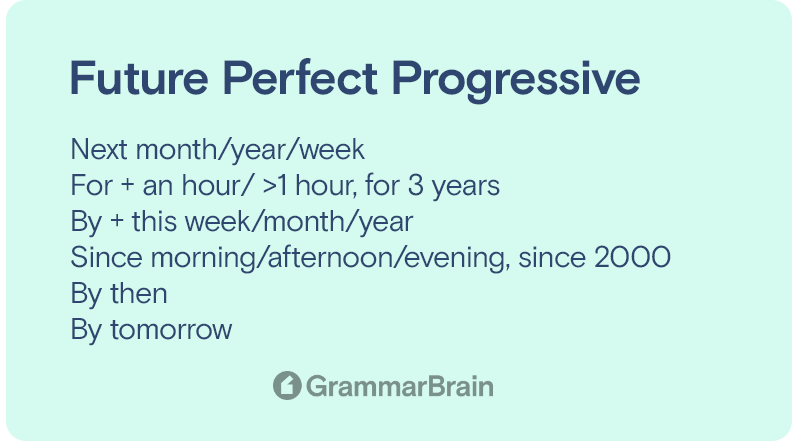What is the future perfect progressive tense? How are sentences formed using this verb tense? What are the grammar rules that govern this tense? These are all great questions, that you probably have. In this comprehensive guide, we’ll break down the meaning of this verb tense and how to use it.

What is the future perfect progressive tense?
There are many types of verb tenses. The main three categories of tenses include the present, past, and future. Among these, there exist other sub-categories. These include simple, progressive, perfect, and perfect progressive.
Future perfect progressive tense (definition)
We have the words ‘future’, ‘perfect’, and ‘progressive’ together. The future perfect progressive tense refers to an action still taking place (perfect progressive). However, it’s referring to something that will get completed soon.
Sentences with this tense include two primary time expressions:
- A time in the future
- Length of the activity
Examples of future perfect progressive tense
- They will have been repairing their house for five days this Friday.
Here, “by Friday” refers to a specific time in the future, and “for three days” refers to the time of the activity.
- Samantha will have been writing an essay for two hours by eight o’clock.
Here, “by eight o’clock” refers to a specific time in the future, and “for two hours” refers to the time of the activity.
- In August next year, you will have been studying medicine for a year.
Here, “in August next year” refers to a specific time in the future, and “for a year” refers to the time of the activity.

How does future perfect progressive tense work?
The future perfect progressive tense is a complicated tense type. This is because it combines two English verb tenses. These are the future continuous tense and the future perfect tense.
Future perfect continuous tense is used to refer to all actions that are ongoing but are yet to occur in the future. They will last only for a particular duration.
Grammar rules that govern future perfect progressive tense
Follow the rules given below to know how to use the future perfect progressive tense –
To show that there is a stipulated time till which the activity will continue in the future
For example:
- Harry will have been teaching at St. John’s High School for nine years by the time he leaves for Spain.
To refer to an action that has been completed just before another action or time in the future
For example:
- I will be hungry when I reach home because I will have been playing football for 2 hours.

Time expressions used along with future perfect progressive tense
The following is a list of time expressions that are commonly used with future perfect continuous tense:
- Next month/year/week
- For + an hour/ >1 hour, for 3 years
- By + this week/month/year
- Since morning/afternoon/evening, since 2000
- By then
- By tomorrow
Differences between the other tenses
The following will provide a clear idea of the difference between future perfect continuous tense and the other tenses –
Verb: See
Simple
Simple Present: see
Simple Past: saw
Simple Future: will see
Progressive
Present Progressive: am/is seeing
Past Progressive: was/were seeing
Future Progressive: will be seeing
Perfect
Present Perfect: has/have seen
Past Perfect: had seen
Future Perfect: will have seen
Perfect Progressive
Present Perfect Progressive: has/have been seeing
Past Perfect Progressive: had been seeing
Future Perfect Progressive: will have been seeing
Why don’t you try a similar list with the verb ‘eat’?
| Tense | Function | Rule | Example |
| Present simple | Helps to describe habits, facts, actions, and truth that are not affected by time | Ist form of verb + s/es | He loves pizza. |
| Past simple | Helps to describe events that have happened in the past | IInd form of the verb | She wore a beautiful dress for the party. |
| Future simple | Helps to describe events that will happen in the future | Will/ shall + Ist form | He will go to New York tomorrow. |
| Present perfect | Helps to describe the relevance of past events in the present moment | Has/ have + IIIrd form of the verb | I have learned to ride a bike. |
| Past perfect | Helps to describe events that happened prior to other events in the past | Had + IIIrd form of the verb | She had finished the paper before leaving the hall. |
| Future perfect | Helps to describe events that will be completed between now and a specific point in the future | Will/ have + IIIrd form of the verb | She will have finished the book by tomorrow. |
| Present continuous | Helps to describe ongoing actions | Is/ am/ are + Ist form + ing | She is reading a book. |
| Past continuous | Helps to describe ongoing events of the past, mostly in relation to another event | Was/ were + Ist form + ing | He was driving to work when the accident happened. |
| Future continuous | Helps to describe future events that will/are expected to continue for a period of time | Will be + Ist form + ing | I will be going to meet my grandparents tomorrow. |
| Present perfect continuous | Helps to describe events that started in the past and will continue into the present | Has/ have been + Ist form + ing | She has been writing a book for the past one year. |
| Past perfect continuous | Helps to describe events that began, continued, and ended in the past | Had been + Ist form + ing | I had been working in this company for ten years when I got the promotion. |
| Future perfect continuous | Helps to describe events that began in the past but will continue until a point in the future | Will/ shall have been + Ist form + ing | I will have been doing business with her for one year. |
How to form the future perfect progressive tense
Use the formulae given below to effectively and efficiently form this tense.
Affirmative future perfect progressive tense
[Subject] + “will have been” + [present participle]
Example:
Sally will have been baking cookies for two hours by six o’clock.
Forming future perfect progressive tense with a present participle
First, form the present participle. This is done by adding an “-ing” to verbs.
Some common examples include the following:
- Eat – eating
- Teach – teaching
Now, use the formula for future perfect continuous, as stated above, to form the tense with a present participle.
Sentence example:
By the end of the competition, I will have been dancing for 6 weeks.
Forming negatives
Negative future perfect progressive tense can be formed using the following formula.
[Subject] + “will not have been” + [present participle]
Example:
I will not have been clicking photographs for 10 years by next month.
Forming questions
Question future perfect progressive tense can be formed using the following formula.
“Will” + [subject] + “have been” + [present participle]
Example:
Will I have been writing my novel for six months by next week?
FAQs
What is the formula of future perfect progressive tense?
The formula for future perfect progressive tense is: will + be + the present participle (root verb + -ing).
Is “will be dancing” future continuous or future perfect progressive?
“Will be dancing” is future continuous tense.
Are future perfect progressive and future perfect continuous identical?
Yes, future perfect progressive and future perfect continuous are the same.
Inside this article
Fact checked:
Content is rigorously reviewed by a team of qualified and experienced fact checkers. Fact checkers review articles for factual accuracy, relevance, and timeliness. Learn more.
Core lessons
Glossary
- Abstract Noun
- Accusative Case
- Anecdote
- Antonym
- Active Sentence
- Adverb
- Adjective
- Allegory
- Alliteration
- Adjective Clause
- Adjective Phrase
- Ampersand
- Anastrophe
- Adverbial Clause
- Appositive Phrase
- Clause
- Compound Adjective
- Complex Sentence
- Compound Words
- Compound Predicate
- Common Noun
- Comparative Adjective
- Comparative and Superlative
- Compound Noun
- Compound Subject
- Compound Sentence
- Copular Verb
- Collective Noun
- Colloquialism
- Conciseness
- Consonance
- Conditional
- Concrete Noun
- Conjunction
- Conjugation
- Conditional Sentence
- Comma Splice
- Correlative Conjunction
- Coordinating Conjunction
- Coordinate Adjective
- Cumulative Adjective
- Dative Case
- Determiner
- Declarative Sentence
- Declarative Statement
- Direct Object Pronoun
- Direct Object
- Diction
- Diphthong
- Dangling Modifier
- Demonstrative Pronoun
- Demonstrative Adjective
- Direct Characterization
- Definite Article
- Doublespeak
- False Dilemma Fallacy
- Future Perfect Progressive
- Future Simple
- Future Perfect Continuous
- Future Perfect
- First Conditional
- Irregular Adjective
- Irregular Verb
- Imperative Sentence
- Indefinite Article
- Intransitive Verb
- Introductory Phrase
- Indefinite Pronoun
- Indirect Characterization
- Interrogative Sentence
- Intensive Pronoun
- Inanimate Object
- Indefinite Tense
- Infinitive Phrase
- Interjection
- Intensifier
- Infinitive
- Indicative Mood
- Participle
- Parallelism
- Prepositional Phrase
- Past Simple Tense
- Past Continuous Tense
- Past Perfect Tense
- Past Progressive Tense
- Present Simple Tense
- Present Perfect Tense
- Personal Pronoun
- Personification
- Persuasive Writing
- Parallel Structure
- Phrasal Verb
- Predicate Adjective
- Predicate Nominative
- Phonetic Language
- Plural Noun
- Punctuation
- Punctuation Marks
- Preposition
- Preposition of Place
- Parts of Speech
- Possessive Adjective
- Possessive Determiner
- Possessive Case
- Possessive Noun
- Proper Adjective
- Proper Noun
- Present Participle
- Prefix
- Predicate



